The first Connections: Festival of Words, which began last Wednesday and ran until Sunday, included talks from poet laureate Carol Ann Duffy and Jane Hawking – ex-wife of world renowned scientist Stephen – whose memoirs inspired the Oscar-winning film The Theory of Everything.
At the launch last week, festival organiser Jennifer Bridge revealed her intention to run Connections as an annual event.
The festival was given a £40,000 grant by the Tourism Development Fund and Economic Development Minister Lyndon Farnham believes that the event will eventually provide returns to the economy as it continues to grow.
He said that the literary festival could become similar to Jersey Live music festival, which was also given a grant in its early years.
Senator Farnham said: ‘We haven’t had the chance to analyse the attendance levels yet but I understand that some of the events were sell-outs and I have received very positive feedback.
‘It is early days but the initial reaction to the event has been very positive and as a growing event this could be of particular interest to potential commercial sponsors so I am hopeful that future events will be sustainable.’
As well as talks from world renowned authors, the festival also hosted a series of workshops including one from Emmy Award winning comedy writer Will Smith.
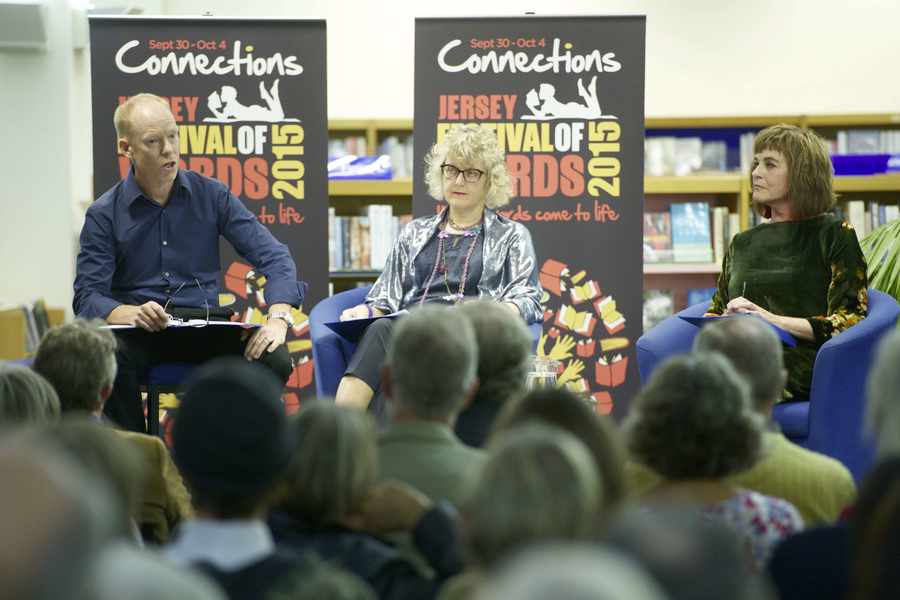
The inaugural Connections: Jersey Festival of Words packed in talks by authors, drama performed by poets, writing and comedy workshops and plenty of local literary interest. JEP writers sampled some of the events
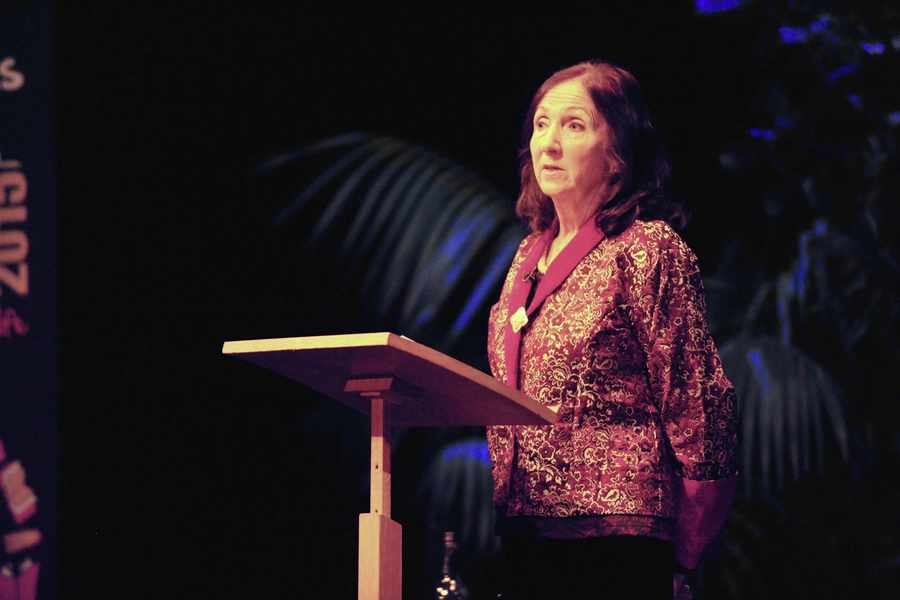
By Caroline Moody
THEY say that behind every successful man, there is a strong and wise woman.
And that has never been truer than in the case of Stephen Hawking, Britain’s most famous scientist.
His first wife, Jane, took part in the inaugural Connections: Jersey Festival of Words by taking to the Opera House stage to talk about her autobiography, Travelling to Infinity: My Life With Stephen.
It followed a screening of the hit 2014 film, The Theory of Everything, starring Eddie Redmayne.
Jane, now a youthful 71, spoke of how the film came about, not entirely with her blessing as producers approached her again and again.
She was pleased with the finished film, though she pointed out some errors and omissions.
She said her parents were not quite as conveyed, and she wished more had been made of their travels together.
However, when she saw the first screening, she said she was ‘bowled over’ by the film.
And she acknowledged that Redmayne had played the part of Stephen ‘brilliantly’ and it had been quite uncanny to meet him in character.
And she was pleased to raise awareness of the debilitating effects of motor neurone disease.
In the Sixties, Stephen Hawking was given two years to live. He has outlived that prognosis by 52 years.
The film perhaps did not show as much of the hardships that Jane lived with, including terrifying fits that threatened to take his life.
She also campaigned for improved disabled access at a time when it wasn’t considered that disabled people might want to ‘buy their own underwear’.
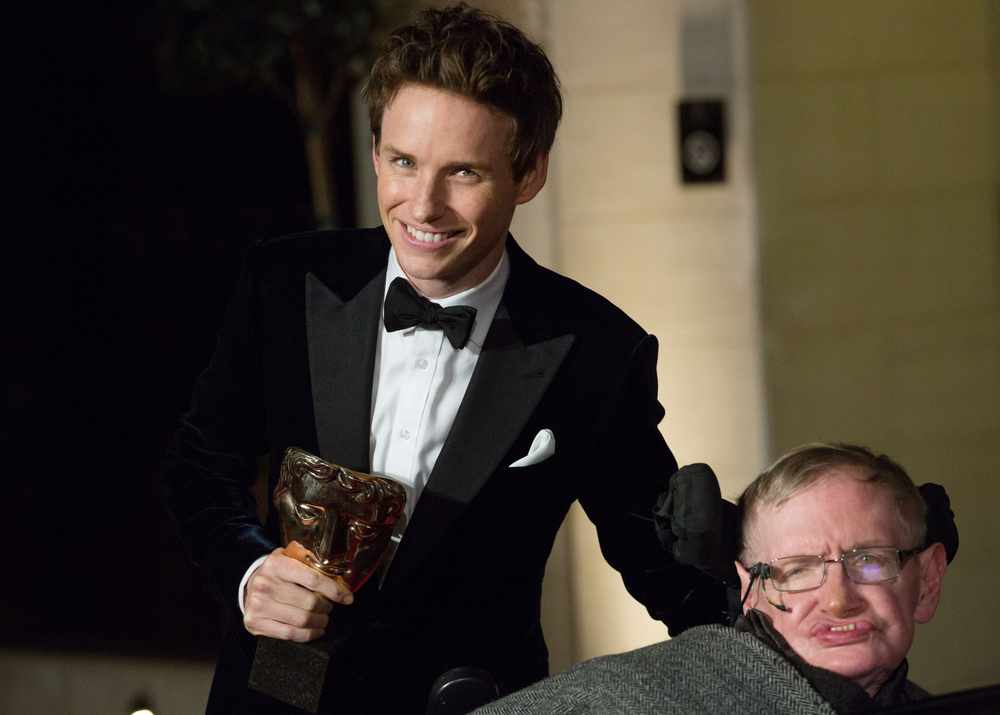
Stephen, who wrote the groundbreaking A Brief History of Time, would have periods of intense concentration.
He thinks in 11 dimensions, Jane said, adding that she was not sure exactly what that means ‘but it’s obviously terribly important’.
In the question and answer session after the talk, a member of the audience asked if she had had any hesitation when refusing to turn off Stephen’s life support machine when he was taken seriously ill.
The decision to keep him alive, she said, was one that she knew she had to make.
She had always been a ‘force of life for Stephen’.
She has indeed. A remarkable woman, and it was inspiring to hear the real person tell her story with such dignity.
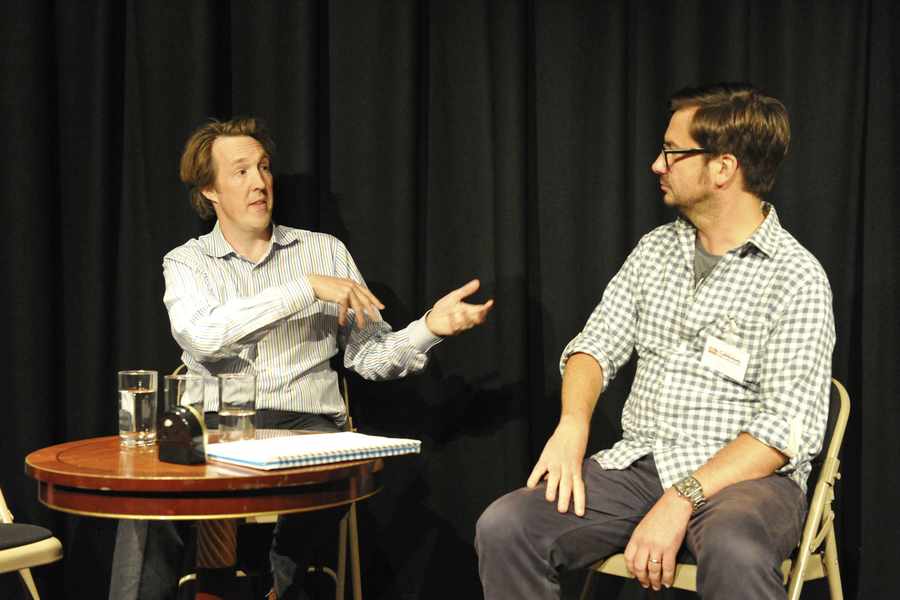
By Thomas Ogg
AS a budding sitcom writer myself, I was very much looking forward to attending Saturday afternoon’s Comedy Script Writing with Will Smith and Roger Drew, not least to see if I could get an answer to every wannabe writer’s eternal bugbear: ‘How do I actually get anyone to read this thing?’.
For the uninitiated, Will and Roger are the enormously talented writing duo behind such TV comedy gold as The Thick of It, Veep and the criminally underrated Time Trumpet.
Sadly, due to a plane delay, Roger was left stranded ‘somewhere over the Channel’ and so it was left to Will to hold the fort; thankfully, the former Victoria College student and stand-up comedian was more than up to task.
Held in the Opera House Studio, Comedy Script Writing saw interviewer and fellow Old Victorian Andrew Davy question Will about his career, his writing process and his reasons for missing the recent Emmy Awards, at which Veep won a handful of awards.
‘I was at the Guernsey Literary Festival,’ said Will, mock-apologetically.
‘It was a bit like when Michael Caine missed out on collecting his Oscar because he was filming Jaws: The Revenge.’
Although Will and Roger had minor success on radio and TV prior to The Thick of It, it was Armando Iannucci’s award-winning, expletive-filled sitcom that was to catapult them both into the big league.
‘We first got involved following the Chris Langham disaster,’ said Will, referring to the talented but troubled actor whose scandalous personal life led to him departing the show after the first series.
‘Armando had given Chris a chance to fail to clear his name, so there was an unexpected break in filming and he said to us, “wanna write an episode?”. It went from there.’
Regarding the show’s writing process, Will described Iannucci’s favoured working method as being akin to ‘a sort of a mosaic’.
‘With Armando, there’s a beginning and an end, and then it’s up to us to fill in the blanks.
‘There’ll be lots of back and forth along the way, with Armando writing comments in the scripts: ‘too written’ or ‘make funnier’ or just ‘no’.
‘It doesn’t really stop until a scene is filmed and we can’t change it any more.’
Admitting that he missed working on the show, Will cited the recent allegations about David Cameron’s hedonistic university days as something he would have enjoyed referencing.
‘It’s the fact that he’s still not officially denied it that makes it so funny,’ he laughed.
Will also spoke about his Jersey-set debut novel, Mainlander, as well as his desire to write a non-comedic TV drama, albeit one in the style of American drama ‘because British drama is always just lots of people in a dark room shouting about corpses,’ he joked.
Unsurprisingly, Armando Iannucci came top of the list when Andrew asked Will to name his main influences, with John Cleese described as his ‘hero’.
‘I’m not concerned with writing likeable characters,’ he said.
‘Take Basil Fawlty. I don’t want to be friends with him, I just like watching him unravel.’
The event concluded with an entertaining audience Q&A (sample question: ‘Is swearing big and clever?’), before Roger Drew finally arrived: sweating, wheeling a suitcase and announcing he was ‘a bit hungover’.
‘So, what’s the secret to your successful partnership?,’ Andrew asked them both.
‘Punctuality,’ said Will and the show ended how it had begun: with roars of laughter.
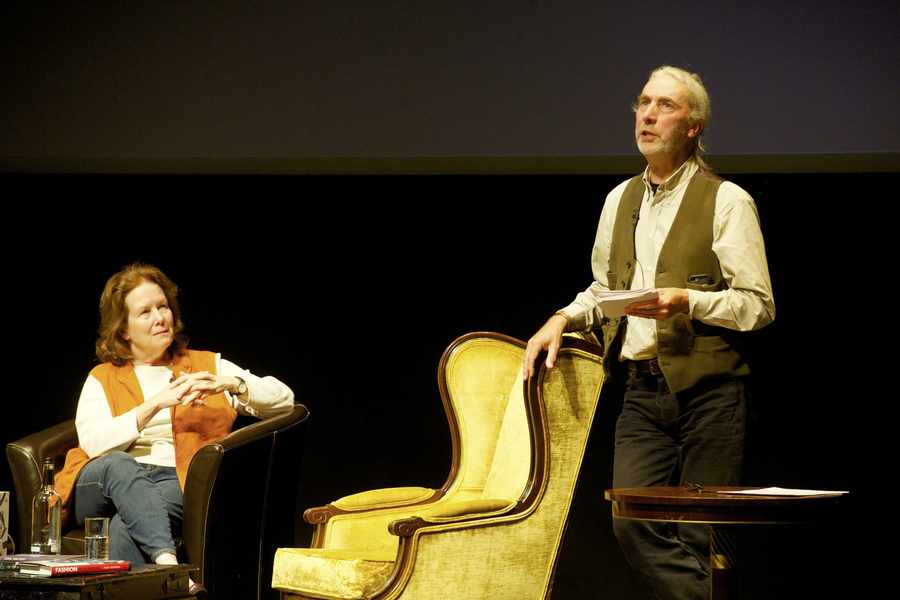
By Matt Andrews
GERALD Durrell is, of course, renowned for his work as a conservationist, but in the first of two talks at Connections: Jersey Festival of Words the journalist and nature writer Simon Barnes concerned himself solely with Durrell the author, and in particular his much-loved autobiographical novel My Family and Other Animals.
Thursday’s event at the Opera House opened with a performance, by Youtheatre, of an extract from Durrell’s 1956 masterpiece describing his blissful boyhood sojourn in 1930s Corfu.
The beautifully acted scene captured the exuberant spirit of the book and the wonderment readers experience when first exploring the enchantingly evoked idyll of Durrell’s childhood.
In the witty, perceptive and sometimes impassioned talk that followed, Barnes argued that Durrell deserved to be considered a great writer because, through an infectious enthusiasm for his subject and a fine line in wry observation, he had ‘captured paradise and brought us joy’.
He punctuated his speech with some choice excerpts from the novel, including an intensely lyrical description of one of the gardens in Corfu, where ‘lady-birds moved like newly painted toys’ and ‘carpenter bees, like furry, electric-blue bears, zigzagged among the flowers, growling fatly and busily’ to ‘the incessant shimmering cries of the cicadas’.
He also gave us the raucously entertaining episode in which Durrell’s eccentric family christen his new boat – a vessel whose ‘circular solidarity’ reminds the author’s young alter ego of ‘an earnest dung beetle’ – the ‘Bootle Bumtrinket’.
A closing question and answer session, for which Barnes was joined by the writer’s widow, Lee Durrell, ‘filled in some of the gaps’ in an absorbing literary portrait and left the audience with the revelation that a new ITV adaptation of Durrell’s Corfu novels is due to be broadcast next year.
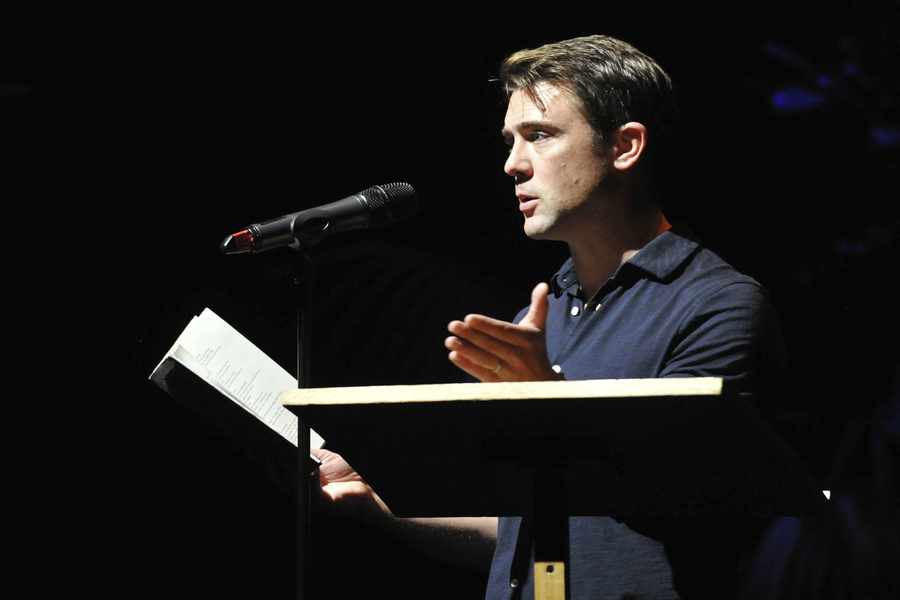
By Gill Kay
POET, playwright and novelist Owen Sheers delivered a powerful and gripping performance of his own work, Pink Mist, at the Jersey Opera House on Saturday night, as part of the Jersey Festival of Words.
The Jersey audience was especially privileged as the author announced that it was only the second time he had performed his verse drama himself.
Playing the six characters in the piece, what he presented was an intense and raw piece of theatre about the experiences of three young solders who served in Afghanistan, and the effect it had on themselves and their families.
The play is based on the real experiences of service personnel interviewed by the author and the story centres on three teenage
friends from Bristol – Arthur, Hads and Taff.
The boys join the army and are sent to Afghanistan where they each have their own horrifying experiences of war.
We are taken through their gut-wrenching stories and their incredibly difficult journey coming back home from the war – mentally as much as physically – with their damaged minds, bodies and souls.
We also see the effect it has on the families as the wife, mother and girlfriend of the soldiers, as the author makes clear, also suffer greatly.
It certainly deserved a much bigger audience.
It’s a deeply moving and thought-provoking piece of work and it’s easy to see why Owen Sheers has been dubbed ‘the war poet of our generation.’






